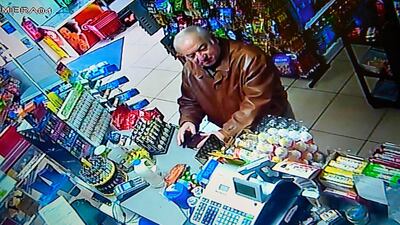The UK’s combative response to an alleged Russian state-sponsored attack on a former spy is being undermined by a failure to stop dirty money from flowing through London.
The funds in question, a group of politicians said on Monday, are controlled by cronies of Russian President Vladimir Putin.
The Putin regime and its allies continued with "business as usual" to hide and launder corrupt assets in the UK, despite the expulsion of 23 Russian diplomats in response to the poisoning of former spy Sergei Skripal in March, according to the MPs cited in a report published on Monday.
The funds, stashed in UK property and investments, could be called on at any time to support Mr Putin's campaign to undermine the nation and its allies, and represented a clear danger to national security, according to the report Moscow's Gold: Russian Corruption in the UK.
_______________
Read more:
Double agent Sergei Skirpal leaves hospital after poisoning
Iran's Zarif in Moscow as Russia moves to save nuclear deal
______________
The report – which is not binding but was compiled by a cross-party group of MPs – calls on the UK government to target more people linked to the Kremlin with sanctions. It also called on the UK, the G7 group of nations and international partners, to tighten loopholes in the sanctions regime that allowed Russia to raise money through the London bond market even after the Skripal poisoning.
The British government has accused Russia under Mr Putin of being behind state-sponsored murder, seeking to hack vital infrastructure and of interference in foreign elections to promote its own global agenda. The attempted murder of Mr Skripal – who was released from hospital last week – sparked an unprecedented response from the UK, 27 other countries and Nato in expelling more than 150 diplomats.
Mr Skripal – who was released from a Russian prison and sent to Britain in 2010 under a spy swap deal – was believed by UK authorities to have been affected by a nerve agent smeared on the front door of his home in Salisbury, southern England, by would-be assassins, who have not been publicly identified.
Despite the strong diplomatic retaliation to the attack by 28 nations, failing to address London’s role in hiding the proceeds of Kremlin-linked corruption signalled that the UK was not serious about the full range of Mr Putin’s offensive measures, the report said.
Committee chairman, Tom Tugendhat MP, said: “There is no excuse for the UK to turn a blind eye as president Putin’s kleptocrats and human rights abusers use money laundered through London to corrupt our friends, weaken our alliances, and erode faith in our institutions.”
The committee heard evidence from anti-corruption campaigner Roman Borisovich who said that the lack of a serious response to money laundering for years had emboldened corrupt Russian figures to believe “that they own Britain”.
He said the political elite in Russia were plundering the country with proceeds turning up in London via the UK’s overseas territories, which have been criticised by campaigners for running financial industries founded on secrecy.
“It all comes here, so we must cut the link that allows the elite to export their loot,” Mr Borisovich told the parliamentary foreign affairs select committee which wrote the report.
He claimed that the expulsion of diplomats, rather than targeting the country’s wealth in response to the Skripal poisoning, meant that “123 Russian oligarchs have a party, because their assets have been preserved”.


